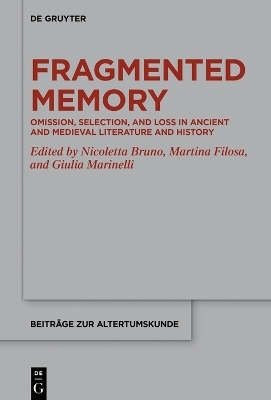Fragmented Memory
Omission, Selection, and Loss in Ancient and Medieval Literature and History
Seiten
2022
De Gruyter (Verlag)
978-3-11-074038-7 (ISBN)
De Gruyter (Verlag)
978-3-11-074038-7 (ISBN)
Die Beiträge zur Altertumskunde enthalten Monographien, Sammelbände, Editionen, Übersetzungen und Kommentare zu Themen aus den Bereichen Klassische, Mittel- und Neulateinische Philologie, Alte Geschichte, Archäologie, Antike Philosophie sowie Nachwirken der Antike bis in die Neuzeit. Dadurch leistet die Reihe einen umfassenden Beitrag zur Erschließung klassischer Literatur und zur Forschung im gesamten Gebiet der Altertumswissenschaften.
Chance, in addition to the unavoidable ambiguity caused by time, is one of the main guilty parties in the transmission of ancient texts – or lack thereof. However, the same cannot be said for what concerns the mechanisms of selection and loss of historical and literary memory, where the voluntary awareness of obscuring is often part of a precise aim, thus leading the cultural memory of a literate society to become fragmented. The present volume explores the devices and criteria of selection and loss in Ancient and Medieval texts and the subsequent fragmentation of such literature, but it also addresses the questions of the damnatio memoriae, of literary strategies such as reticence and omission, as well as of known texts deemed lost but re-found thanks to state-of-the-art methods in digitization. The many and diverse nuances of the concepts of omission, selection, and loss throughout Ancient and Medieval literature and history are illustrated through a number of case studies in the four sections of this volume, each examining a different facet of the topic: ‘Mechanisms and criteria of textual loss and selection’, ‘Lost texts re-discovered’, ‘Voluntary omissions and desire for oblivion’, and ‘Re-working the known’.
Chance, in addition to the unavoidable ambiguity caused by time, is one of the main guilty parties in the transmission of ancient texts – or lack thereof. However, the same cannot be said for what concerns the mechanisms of selection and loss of historical and literary memory, where the voluntary awareness of obscuring is often part of a precise aim, thus leading the cultural memory of a literate society to become fragmented. The present volume explores the devices and criteria of selection and loss in Ancient and Medieval texts and the subsequent fragmentation of such literature, but it also addresses the questions of the damnatio memoriae, of literary strategies such as reticence and omission, as well as of known texts deemed lost but re-found thanks to state-of-the-art methods in digitization. The many and diverse nuances of the concepts of omission, selection, and loss throughout Ancient and Medieval literature and history are illustrated through a number of case studies in the four sections of this volume, each examining a different facet of the topic: ‘Mechanisms and criteria of textual loss and selection’, ‘Lost texts re-discovered’, ‘Voluntary omissions and desire for oblivion’, and ‘Re-working the known’.
lt;strong>N. Bruno, LMU Munich, Germany; M. Filosa, Univ. of Cologne; G. Marinelli, Sapienza Univ. of Rome, Italy / Univ. of Cologne, Germany.
| Erscheinungsdatum | 23.02.2022 |
|---|---|
| Reihe/Serie | Beiträge zur Altertumskunde ; 404 |
| Zusatzinfo | 3 b/w and 16 col. ill. |
| Verlagsort | Berlin/Boston |
| Sprache | englisch |
| Maße | 150 x 230 mm |
| Gewicht | 616 g |
| Themenwelt | Geschichte ► Allgemeine Geschichte ► Altertum / Antike |
| Geisteswissenschaften ► Sprach- / Literaturwissenschaft ► Literaturwissenschaft | |
| Schlagworte | Historical and literary memory • Historisches Gedächtnis • Historisches und literarisches Gedächtnis • lost texts • textual transmission • Überlieferungsgeschichte • Verlorene Texte |
| ISBN-10 | 3-11-074038-9 / 3110740389 |
| ISBN-13 | 978-3-11-074038-7 / 9783110740387 |
| Zustand | Neuware |
| Haben Sie eine Frage zum Produkt? |
Mehr entdecken
aus dem Bereich
aus dem Bereich
die Inszenierung der Politik in der römischen Republik
Buch | Hardcover (2023)
C.H.Beck (Verlag)
48,00 €
Buch | Hardcover (2024)
Klett-Cotta (Verlag)
50,00 €




